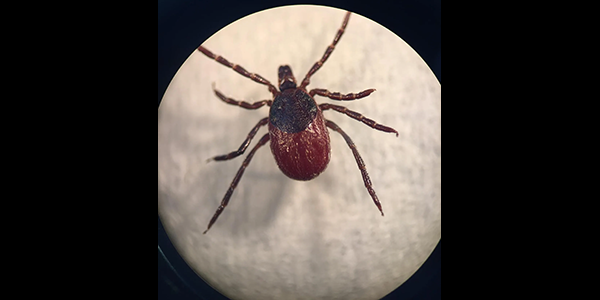||| FROM RUSSEL BARSH for KWIAHT |||
Native ticks are emerging about a month early due to unusually mild fall and early winter weather; be sure to check yourself and your dog if you go hiking or dog-walking along trails or in brushy areas of the island. Local ticks are most likely to be encountered along frequently used walkways or trails bordered by shrubs or tall, uncut grasses. They can range from black nymphs the size of a sesame seed, to adults the size of pumpkin seeds when fully engorged with blood. If you remove a tick within a few hours, it is very unlikely to pass along any infectious disease or microparasite that it may be carrying.
Kwiaht has studied more than two hundred ticks removed from people and pets in the islands over the past two years, and about one in ten ticks are infected with something that can cause illness in people and/or pets. The most common infectious agent in San Juan County ticks is Babesia, a microparasite that can cause Lyme-like symptoms. Our local ticks mainly carry Babesia species that are native to the Pacific Coast and may not all be harmful to humans; they are under study by the Centers for Disease Control, and Kwiaht is contributing to this research in cooperation with the Washington Department of Health.
Other infectious diseases associated with ticks in our area include Anaplasmosis, Ehrlichiosis, Spotted Fever, and Mycoplasma. Thus far, no infectious Lyme has been detected in San Juan County. Ticks are especially likely to feast on dogs in the islands. Ticks can be difficult to find on dogs with long, dense coats, and may remain attached for several days without detection. People traveling with dogs from the mainland or neighboring states or provinces should be especially vigilant, since dogs appear to be responsible for introducing exotic tick species and new infectious agents to our islands.
If you find a tick on a family member or pet, we encourage you to mail it to Kwiaht, PO Box 415, Lopez Island 98261, with your contact details, and information on where and when you believe that the tick was encountered. All ticks removed from people, and a subsample of ticks from pets, will be tested for Borrelia (Lyme), Babesia, and other infectious diseases, and you will receive results by email or phone.
You can also help by discussing local ticks and tick-borne disease with your local health provider and veterinarian; and by considering a donation to Kwiaht through our website, www.kwiaht.org, to help maintain our ability to provide tick-testing services; 100 percent of donations go to clinical lab costs.
**If you are reading theOrcasonian for free, thank your fellow islanders. If you would like to support theOrcasonian CLICK HERE to set your modestly-priced, voluntary subscription. Otherwise, no worries; we’re happy to share with you.**








“People traveling with dogs from the mainland or neighboring states or provinces should be especially vigilant, since dogs appear to be responsible for introducing exotic tick species and new infectious agents to our islands.”
Seems like a potentially major public health problem that is easily remedied by not allowing non-residents to bring their dogs on the ferries. That is not a perfect solution but should we really be allowing parasites and pathogens to be imported to the islands in the name of tourism?
This article mentions dogs. Do cats carry potentially dangerous ticks as well?
We (Kwiaht) have received few ticks found on cats (less than a dozen).
Thank you (yet again!) for an informative article. So grateful for your work and keeping us (the general public) apprized.